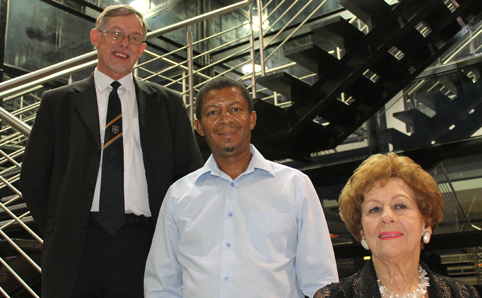Latest News Archive
Please select Category, Year, and then Month to display items
30 October 2018
|
Story Rulanzen Martin
|
Photo Peet van Aardt
 Some of the student writers who contributed to the anthology that tells their stories in Sesotho, isiXhosa, isiZulu, English and Afrikaans.
Some of the student writers who contributed to the anthology that tells their stories in Sesotho, isiXhosa, isiZulu, English and Afrikaans.
How do you transform the higher education curriculum? You involve the exact people the curriculum is intended for. The book, Initiative for Creative African Narratives (iCAN,) illustrates how decolonisation can be achieved through literature for students by students.
iCAN is an initiative by the Centre for Teaching and Learning (CTL) at the University of the Free State (UFS) to mentor students in creative and narrative writing. Under the mentorship of Dr Peet van Aardt, project coordinator, and Ace Moloi, author and UFS alumnus, iCAN Volume 1 was recently launched with 47 short stories written by UFS students.
“The project is a response from the centre for the ever-increasing need for decolonised curricula, steeped in the local cultural perspective of ubuntu,” said Dr Van Aardt.
“This book is an example for how decolonisation can be implemented,” said Prof Francois Stydrom, Senior Director of CTL. The overall aim of the iCAN project is to have the content that materialised from it to be included in the curriculum of first-year students at UFS in the near future.
Book provides multiple voices
Starting in May 2018, CTL presented a series of creative writing workshops on all three of the UFS campuses. “It’s a medium that allows a diverse range of students to express their views and develop their voices as writers,” said Prof Strydom.
It is a form of empowerment, to pass the baton to students to improve the UFS curriculum by writing and publishing their own stories, thereby contributing to larger bodies of knowledge through their lived experiences.
“I believe we as a university need to enable students so that they move away from just being users to becoming contributors to the curriculum,” Dr van Aardt concluded.
Two new buildings for Health
2012-03-06
 |
|
The James Moroka building and the Muller Potgieter building of the Faculty of Health Sciences were officially taken into use in February this year. Present at the ceremony was from left Prof. Gert van Zyl, the Dean of the Faculty of Health Sciences, Mr Benjamin Moroka, son of Dr James Moroka, and Mrs Mari Potgieter, wife of Dr Muller Potgieter.
Photo: René-Jean van der Berg
06 March 2012
|
The university of the Free State boasts two new modern buildings on the Bloemfontein Campus that were erected specially for the Faculty of Health Sciences.
The James Moroka building and the Muller Potgieter building were officially taken into use recently. Family members of Dr Moroka and Dr Potgieter were present and unveiled the cornerstone.
The Faculty of Health Sciences experienced a growing shortage of office space and lecture halls on campus. To address the situation, the grounds of the old vehicle pool were used to construct the buildings. Its prime location – opposite the faculty’s existing building – was a bonus.
The National Department of Higher Education and other interested parties worked together to construct the buildings in as short a time as possible. The buildings have been in use since the beginning of the year.